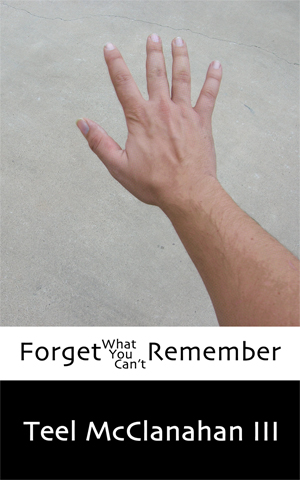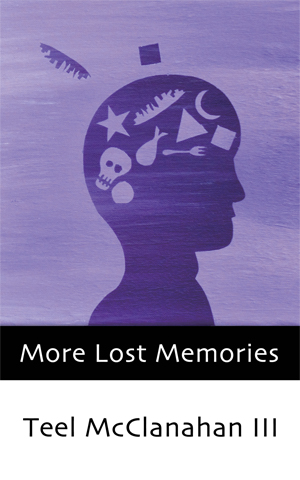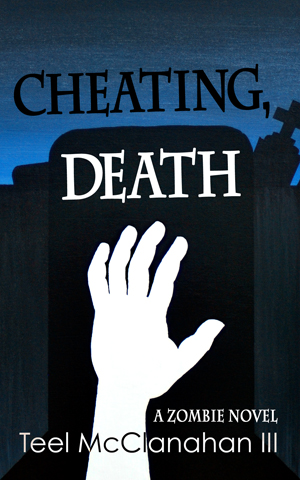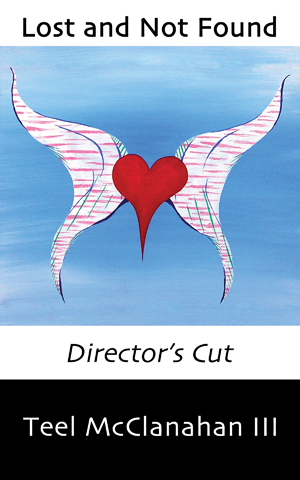by Teel McClanahan III, Copyright © 2009
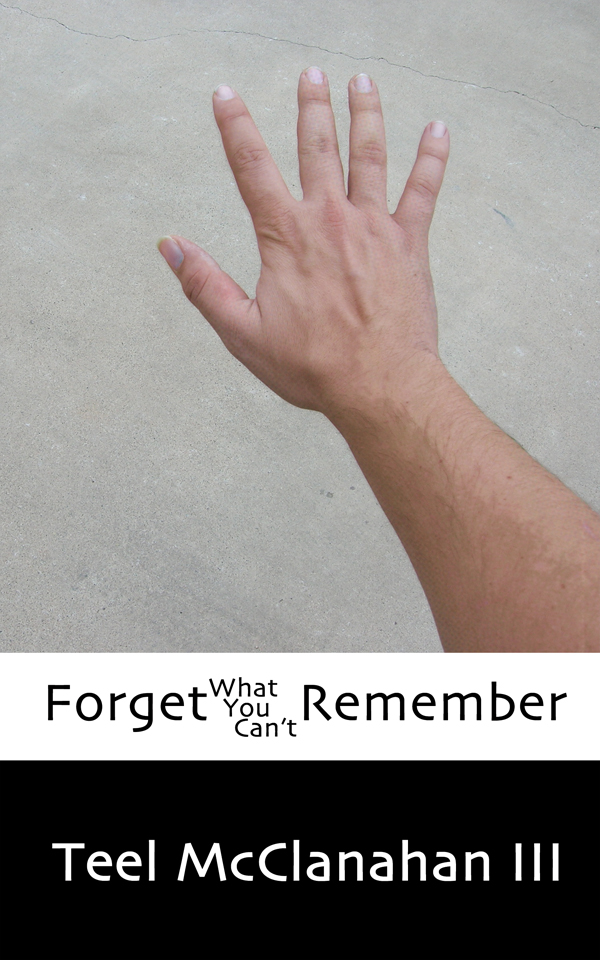
An experimental novel with Science Fiction, Fantasy, and Horror elements
eBook
The eBook edition of Forget What You Can’t Remember is available under  .
.
You can get the eBook for FREE, using this link:
About the book
The unexplained event which changed the world at the end of Lost and Not Found is just days away, and Paul thinks he’s found the perfect place to hide; the high-tech flying city of Skythia. Meanwhile, Lorraine, Mary, Lance, and Brady are attending the Sergeant’s zombie-readiness training camp when word comes in that there’s been a major zombie outbreak in Denver – and the Sergeant is taking all his half-trained campers along with him to attempt containment.
Not long after the world is remade by the unseen event into something a little more fantastic than it was before, Skythia hurries to the aid of Denver’s survivors, taking the uninfected aboard and offering them all the benefits of its utopian society. As Skythia’s newest residents try to come to terms with the apparent paradise all around them, the traumas of fighting zombies and the unanswered mystery of what the event really did to them continues to torment each survivor in their own way. Finding love and holding on to it, finding their place in a future of limitless possibility, and learning to let go of a past they can’t easily recall prove to be more difficult than anyone expected.
Some will be driven to madness, others to dangerous obsession, and when a superhero who shouldn’t really exist shows up, everything they’ve been working for in life and in love comes to a violent and destructive intersection which threatens the existence of the entire solar system. Not everyone will survive, but they’ll all be forced to face their own missteps and to deal with the irreversible consequences.
From the back cover:
Zombies! Doomsday!
And someone who actually finished writing a novel in a month!
Mary, Lance, Brady, Lorraine, and the Sergeant are a handful of the survivors from a zombie outbreak that decimates a city. Each of them responds a little differently in the aftermath of the tragedy and to the inexplicable and possibly unrelated memory loss some of them seem to be suffering.
Paul is obsessed with a worldwide cataclysmic event he’s been predicting for years, and while everyone else seems able to go on with their lives in its wake, he just can’t let it go. Add a utopian city in the sky and a mathematician who can fly, then watch all these elements intersect and converge in a place where some see a moral void and others can’t escape deep questions of right and wrong.
Forget What You Can’t Remember explores everything from economics and ethics to politics, post-traumatic recovery and the loneliness of heroism. If it doesn’t leave you guessing, it’ll at least get you thinking.
More Lost Memories is a companion book to Forget What You Can’t Remember, a collection of short stories each of which delves deeper into a character, event, or situation from this book. Find out how the zombie trainers died, about Lance’s restaurant, what was really going on in chapter 21, and more.
Available now from Modern Evil Press.
Books in this series:
About the Author
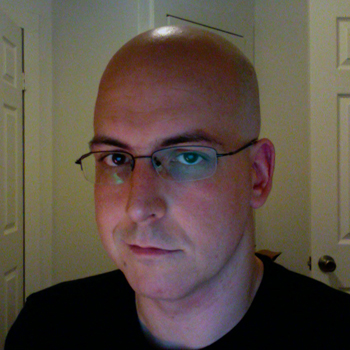
Teel is an independent author, artist, game designer & developer, creative visionary, podcaster, and publisher.
Teel is happily married to an English teacher and they live together in Phoenix, AZ with a cat which does not appreciate having Teel read his books aloud to it nearly as much as you probably would. While satisfied with never having to shovel the desert’s heat from his driveway, Teel is interested in experiencing more travel in his life—especially of sorts like “through time” and “to other planets,” so feel free to invite him along if you’re going.
Follow him on: Twitter, YouTube, and Goodreads
Podcast Audiobook
The Audio version of Forget What You Can’t Remember was recorded in 2008-2009, and podcast both on the Modern Evil Podcast and on Podiobooks.com in 31 parts. The following is a list of links to all episodes of Forget What You Can’t Remember on the Modern Evil Podcast:
- Chapter 1 – In which Lance sets Brady straight about the zombie survival training camp they’re both headed to, Mary talks Lorraine into attending the same camp with her, and the two head trainers there discuss running the camp without the Sergeant.
- Chapter 2 – In which Paul and Eddie discuss the financial viability of the novel which Paul wrote in less than a month about the Doomsday now only a few days away.
- Chapter 3 – In which Paul makes his escape from the Doomsday he’s been predicting, arriving via private flight to Skythia -a flying city- in the middle of the night and being met by the city’s Mayor, Colm O’Reiley, who is eager to do whatever it takes to protect the city.
- Chapter 4 – In which the Sergeant first hears about a zombie outbreak near Denver he’s partially responsible for, we learn that he ended up with Lorraine rather than Mary, and Lance and Brady set out to try to finish their training in time to face the Denver outbreak.
- Chapter 5 – In which Skythia’s navigation and timekeeping systems are all either shut off or randomized -to keep any Skythians from being able to see or even know when Doomsday hits- and Colm shows Paul the city’s transportation network and its awe-inspiring skyline.
- Chapter 6 – In which Lance and Brady, while running through the zombie-infested streets of Denver, discuss their current predicament.
- Chapter 7In which, on the third day after hiding the world and the time from Skythia, Paul gives the go-ahead to switch everything back on and look around, allowing Skythians to find out that Denver has been lost to zombies.
- Chapter 8 – In which the survivors in Denver prepare for Skythia’s arrival, Paul arranges to be among the Skythians heading to the surface to meet them, and then Paul and Mary meet for the first time.
- Chapter 9 – In which Paul, Mary, and other survivors of the zombie outbreak begin going through Skythia’s full orientation while waiting for their quarantine period to end before they are allowed into the city proper.
- Chapter 10 – In which Paul and Mary walk the circumference of Skythia while discussing the silence and distance still lingering about her, two weeks after the rescue at Denver.
- Chapter 11 – In which the Sergeant and Lorraine discuss the personal and political ramifications of living in Skythia.
- Chapter 12 – In which Lance refutes Brady’s paranoid suspicion that Skythia must have a dark underbelly or some secretly repressed group on board, and Paul has a panic attack so severe it results in an emergency medical response.
- Chapter 13In which Paul and Brady meet coincidentally in the lobby of a psychiatrist’s office and discuss disappointment, disassociation, and Skythia’s radical, pro-active resident wellness program.
- Chapter 14 – In which Lorraine and the Sergeant discuss his plans to clone rare and extinct dangerous creatures and fight them, in a series of cage matches, to the death.
- Chapter 15 – In which Lance and Brady discuss Paul’s relationship with Mary, some of the extreme body modifications available in Skythia, and the challenge of getting into Skythia’s top culinary school without good references.
- Chapter 16 – In which Mary discovers the disreputable background of Paul’s psychiatrist, she and Paul discuss the actual cause of his mental unbalance, and they read his mysteriously surviving novel about the Doomsday come and gone.
- Chapter 17 – In which Paul and Brady get into further detail about Brady’s dissociative disorder, consider the fine line between perception and awareness, and Brady reveals his idea of something worth living for. Also: The image on the book’s cover was partially inspired by a scene in this chapter, and partially by how the concept explored in that scene applies to the entire experience of reading this book.
- Chapter 18 – In which Paul and Mary discuss his ideas about trying to build a machine capable of restoring memories -and perhaps also people, places, and things- from before Doomsday removed them from the world.
- Chapter 19 – In which the Sergeant discusses the subtle and complicated smellscape his dangerous animals habitat will be employing with the scent expert installing the system that will create it, and then discusses the competitive mixed martial arts group that he’s found himself having to create.
- Chapter 20 – In which the deep personal and ethical quest of Fantastician (also known as Job) begins with a chance encounter in a deep, dark forest that climaxes in a nearly failed rescue.
- Chapter 21 – In which Fantastician interrupts a group of murderous thieves as they storm a Kwytzwik Temple, and finds himself thrust further along his path of realizing the oblivion he hadn’t noticed in himself.
- Chapter 22 – In which Fantastician encounters a battlefield whose complexities and ethical uncertainty serve mainly to unhinge him from any sense of direction or purpose, even after he takes dramatic action to bring the conflict to a rapid conclusion.
- Chapter 23 – In which Fantastician reaches Denver and sets himself to the long, hard, solitary work of cleaning it of zombies and of the damage they wrought there.
- Chapter 24 – In which Fantastician explains his various super powers to the Sergeant, and explains the details of the Denver zombie cleanup to a group of Skythians.
- Chapter 25 – In which Brady and Colm, the mayor of Skythia, discuss how the lack of zombies in Denver will effect his plans to destroy the infested city with his Doomsday device.
- Chapter 26 – In which Mary explains to Paul, in a way he finally begins to understand, why she doesn’t want him to use his machine on her to restore her memories of before Doomsday – but ends up leaving him, anyway.
- Chapter 27 – In which Fantastician discusses ethics, zombies, martial arts, and memory loss with Paul, before trying to help with the mathematics Paul’s machine were based on.
- Chapter 28 – In which Paul and Colm witness Fantastician’s participation in the Sergeant’s mixed martial arts competition as it takes a terrible turn, and then Fantastician briefly confronts Brady between frantic dashes to destroy his doomsday devices.
- Chapter 29 – In which Fantastician flies toward the sun, and toward Brady’s doomsday device, at incredible speeds requiring his advanced knowledge of math and physics to save the day, then returns to Skythia to stop Brady’s next, nano-scale, attempt to destroy the world.
- Chapter 30 – In which Paul and Fantastician discuss, over lunch, the counterintuitive repercussions of the heroic actions which saved Skythia -and the rest of the Solar System- from Brady’s doomsday devices and then, after lunch, Paul uses his machine to try to restore Fantastician’s memories.
- Chapter 31 – In which Lorraine and the Sergeant discuss how all his plans and aspirations have been torn apart, seemly all at once, and then Paul and Mary discuss his putting a stop to all future attempts to undo doomsday after what happened to Fantastician in his machine.
Not a ‘Zombie Book’
Forget What You Can’t Remember is a book that has zombies in it, but it is not a zombie book. It is not a horror book. It is not a science fiction or a fantasy book, either, despite the existence of a flying city, robots, and elves in the world where it takes place. It is not an action book — in fact, it may be the antithesis of an action book, when you step back and look at the whole experience. What is Forget What You Can’t Remember, if it is not these things?
It is a novel about people. Some of the people in the novel encounter zombies and, in fact, survive a full-scale zombie outbreak in a major US city. Some of the people in the novel, after becoming rescued rescuers, find there are gaps in their memories; whole swaths of their lives and their histories that are entirely lost. Suddenly given limitless possibilities for the future and robbed of their pasts, each charater reacts -and interacts- in different ways. Some follow their dreams, some try to continue living in the past they’ve had to leave behind, and at least one loses his grip on sanity.
The bulk of the story is told, not through description of actions, settings, and characters, but through the dialogue those characters have about the settings they find themselves in and the actions and events they’re experiencing and planning. This is simultaenously so intimate that a reader can lose track of the boundaries between characters and so distancing that it can give the impression that you are only experiencing the story second-hand. That feeling of being both present and distant at once mirrors the way more than one of the main characters’ minds reacts in the wake of tragic, traumatic events. In the scene in chapter 17 which inspired the cover image, two characters discuss this experience which could probably be diagnosed as depersonalization disorder:
“Huh.” Paul couldn’t identify personally or exactly with Brady’s experiences, but somehow understood him, in a way. “Are you experiencing this disassociation from reality right now?”
“No, I,” Brady paused to consider whether what he was saying was true. He stopped walking, and stood in the street for a moment looking down at his body and back up to the world around him. He held his right hand up in front of his face, staring intently at it. “I’m trying to decide if it feels like I’m staring at my own hand or if I’m watching me stare at my own hand.” Paul was now also staring intently at Brady’s hand, trying to more consciously notice his own awareness of perception. “Though just being present enough to be able to think about the difference is probably both a sign that I’m not experiencing it, and what truly surreal experiences even its memory allows me now to have.”
“Truly.” Paul was now staring at his own hand and contemplating the separation between perception and awareness as though for the first time. “Consciousness itself is clearly not mere eyes and ears and instincts, but the thought of being able to be conscious of one’s own consciousness is a sort of Klein bottle with no boundary, zero volume, and which despite seeming to be immersed in the visible world always keeps some critical part in a higher plane of being, beyond our grasp.”
Brady now took his turn to stare at Paul, though more like an examination of another’s sanity than one’s own perceptions. Brady stood there, staring at Paul staring at his own hand, apparently deep in thought, then spoke. “I have no idea what you just said.”
Then, when the narrative takes a dramatic turn toward long description and to action, the character experiencing and initiating the action is turned increasingly away from it by his own apparent memory loss and the philosophical line of thought it takes him down. A strange and difficult twist near the end of the book then seems to erase all evidence of his action -of everything described in detail rather than in dialogue- from the book, leaving nothing behind but the second-hand and the distant. The reader, if they realize this post-modern slight of hand at all, is left in the same situation as the characters; what you thought happened hasn’t, and what has happened is at least out of arm’s reach.
In trying to create this meta-experience paralleling that of the characters, the book loses the ability to easily serve the expectations of mainstream readers. It loses the ability to meet the expectations of readers looking for a traditional zombie book. It loses the ability to serve those looking for it to fit neatly into a genre slot, any genre at all. Instead, it serves the mind. It encourages thought. It attempts not just to describe a thing, but to deliver it into the reader’s consciousness. Forget What You Can’t Remember is not a book for everyone, and it may not be what you expect, but it may be the only book you read this year that is what it says.



